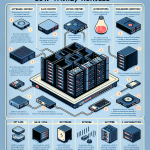How a Homelab Can Launch Your Tech Career Without a Degree
When I first considered the possibility of entering the tech field without a formal degree, I felt a wave of doubt wash over me. How was I supposed to compete with seasoned professionals boasting impressive academic credentials? But then I discovered the concept of a homelab—a personal playground where I could learn and experiment at my own pace. I can’t stress enough how transformative this experience has been for my journey into technology.
1. Show, Don’t Just Tell
In the world of tech, it’s crucial to demonstrate your abilities rather than merely listing them on a resume. Imagine walking into an interview and confidently stating, “This is my homelab setup.” With a homelab, I created a tangible proof of my networking skills, virtualization knowledge, and troubleshooting abilities.
For instance, I have designed a self-built network complete with virtual machines, subnets, and firewall rules. When hiring managers see that I can talk through the intricacies of my design, they recognize the effort and knowledge I have poured into building it. “Show me the project, not just the words” they seem to say, and I can do just that.
2. Build Practical Skills
Setting up a homelab has been like attending an interactive course where I signed up for every subject imaginable—servers, networking, virtualization, and automation. The hands-on experience I gained is second to none. Think about it: when I set up a web server, I wasn’t just memorizing commands. I was troubleshooting problems, handling misconfigurations, and addressing unexpected issues as they arose.
This process has turned theoretical knowledge into practical skills that I can carry into any job. *The real world is messy*, and by grappling with those challenges at home, I emerged more confident and prepared for whatever the tech jungle throws at me.
3. Focus on Relevant Technologies
The beauty of a homelab is the adaptability it offers. I could easily pivot between current technologies that are highly sought after by employers. Curious about cybersecurity? I set up a virtual lab to delve into penetration testing and threat detection. Excited about DevOps? I harnessed the capabilities of my homelab to deploy CI/CD pipelines and automate tasks with tools like Ansible.
By selectively focusing on the right technologies, I was tailoring my learning experience to align with market demands. This strategic approach made my skill set distinctly attractive to potential employers.
4. Learning Through Failure
Let me tell you, one of the most thrilling—and, at times, heart-wrenching—parts of this journey has been learning through failure. A homelab is a nurturing environment where it’s perfectly okay to break things, troubleshoot like a detective, and ultimately fix them. This is often the missing piece in formal education, which frequently shies away from the chaos and messiness of real-world problems.
Employers appreciate resilience and resourcefulness. They seek individuals who can think critically under pressure, and my experiences in the homelab have fostered those exact qualities. Every failed attempt became a stepping stone towards something greater, a lesson I carry with me into job interviews.
5. Creating a Portfolio
One delightful surprise in my homelab journey was realizing that my projects can serve as a dynamic portfolio. I began documenting everything: writing about setup processes, creating visuals of my network, and saving code snippets on central repos.
Having these tangible assets allows me to present a well-rounded picture of my skills to potential employers. It’s not just about what I know; it’s about how I apply that knowledge in practical scenarios. This kind of proactive documentation makes my portfolio much more compelling.
6. Connect with the Community
Building a homelab isn’t a solo journey—it’s an interconnected web of friendships and collaborations. I stumbled upon incredible online communities dedicated to homelab enthusiasts, where people share their setups and solutions. Engaging with these communities was enlightening!
Through forums and subreddits, I found mentors, learned new tricks, and connected with others who share my passion. More importantly, these connections can sometimes lead to job referrals and networking opportunities—a solid advantage when you don’t have a degree backing you.
Final Thoughts
In conclusion, I firmly believe a homelab is more than just a collection of gadgets and machines. It stands as a monument to perseverance, excitement, and personal initiative. As I navigated this unconventional path into the tech world, I learned that passion can often outweigh qualifications.
If you are feeling discouraged about breaking into the tech industry without a degree, take heart! Your homelab can be your secret weapon. Just think of the various skills you can acquire—whether it’s understanding DevOps or mastering cybersecurity—and the meaningful projects you can showcase.
So, my friends, why not begin constructing your homelab today? You may find it not only sharpens your skills but also lights up the pathway toward your dream job. If you have found this information helpful or have your own experiences to share, I would love to hear from you in the comments below!
For more insights on developing your tech skills, consider checking out the [FreeCodeCamp] or [Codecademy] platforms. Happy labbing!



